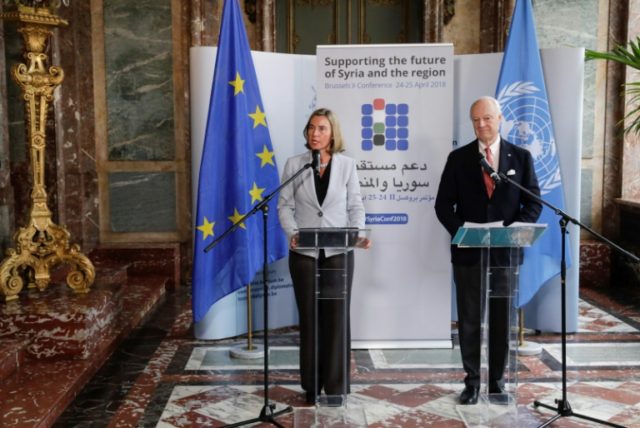Brussels (AFP) – The UN’s Syria envoy Staffan de Mistura on Tuesday urged the world to prevent a fresh humanitarian disaster in the rebel-held region of Idlib, as officials warned aid funding was running “desperately short”.
Mistura told a major donor conference that Idlib, the likely next target of the Syrian regime’s fightback, risked suffering the same fate as Aleppo, seized in a Russian-backed Syrian offensive in 2016, and Eastern Ghouta, retaken by the regime shortly after an alleged chemical attack in early April.
Donor countries, aid organisations and UN agencies are gathering in Brussels for the seventh annual conference on Syria’s future, as forces loyal to President Bashar al-Assad launched a new offensive against Islamic State jihadists entrenched in a southern district of Damascus.
“We were and are concerned on the humanitarian side by Idlib. Because Idlib is the big new challenge, 2.5 million people,” Mistura told a press conference with EU diplomatic chief Federica Mogherini.
“We hope that this would be an occasion for making sure that Idlib does not become the new new Aleppo, the new Eastern Ghouta, because the dimensions are completely different.”
The head of UN aid agency UNOCHA chief Mark Lowcock said the two-day gathering needed to raise some $8 billion in pledges for work inside Syria and with refugees in neighbouring countries, warning that some programmes may have to be cut back if funds are not forthcoming.
“We are quite desperately short of resources,” he told reporters, saying UNOCHA managed to raise only half of the funds it needed in 2017 and urging Damascus and its main backer Russia to do more to help civilians suffering in the war.
– ‘Can’t meet urgent needs’ –
Some 6.1 people are now internally displaced, more than five million have fled Syria and 13 million including six million children are in need of aid, according to the UN. More than 700,000 people have been displaced since the start of this year alone.
“Within the resources we can plausibly expect to mobilise this year we cannot meet even all the urgent needs,” Lowcock said.
UN and EU officials held talks with aid groups working in Syria and neighbouring countries on Tuesday to get their views before government ministers arrive on Wednesday.
Save the Children International chief executive, Helle Thorning-Schmidt, urged donors to focus on education, saying a third of Syrian youngsters are out of school and a third of Syrian schools are unusable because of the war.
“We have let Syrian children down. This is the seventh year and they’re still being let down,” Thorning-Schmidt told AFP.
UN children’s agency UNICEF said some 2.8 million Syrian children had missed out on education, warning that in parts of the country simply going to school “has at times become a matter of life and death”.
– ‘Syria is not a chessboard’ –
The EU also wants to use the conference to re-energise floundering UN-led peace talks in Geneva, which have made virtually no progress in eight rounds, with Assad’s government paying little interest and Russia, Iran and Turkey launching a rival process in the Kazakh capital Astana last year.
Russia and Iran are Assad’s key allies and their military intervention in Syria is widely seen as tipping the balance in the civil war.
Mogherini and de Mistura both called on Russia, Iran and Turkey — the three powers involved in the so-called Astana process seeking peace in Syria — to do more to reach a ceasefire.
“The main message is that Syria is not a chessboard, it’s not geopolitical game,” Mogherini said.
The conference comes in the wake of strikes by the United States, France and Britain on Syrian military installations in response to the alleged chemical weapons incident in Douma which has been widely blamed on Damascus.
Mistura said a UN Security Council retreat in a secluded farmhouse in Sweden at the weekend, called in a bid to overcome its paralysis on Syria, had lowered the “temperature” but failed to find a political solution.
“After two weeks of terribly tense and rhetorically intense meetings, there was a need again to bring down the temperature,” Mistura said.
“Has this avoided or completely resolved the division which exists in the Security Council on Syria, which is the biggest problem the UN has… no,” he added.
“Has the atmosphere gone down and the understanding that there are common issues that can be faced together, yes,” Mistura said.

COMMENTS
Please let us know if you're having issues with commenting.